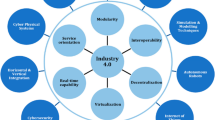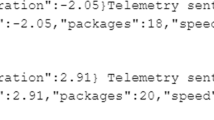Abstract
At present, cloud services and cloud manufacturing are developing rapidly, speed and accuracy have become the themes of cloud manufacturing development. The core component of cloud manufacturing is resource portfolio optimization. In cloud manufacturing today, the scale of service portfolios is expanding rapidly, and the number of candidate services which in the service pool is increasing gradually. To adapt to the development of cloud services, an optimization algorithm with faster speed, greater precision and higher stability is required to solve the problem of cloud service composition and optimization (CSCO). To increase the convergence rate and avoid falling into local optima with the artificial bee colony algorithm, a self-learning artificial bee colony genetic algorithm (SLABC-GA) is proposed in this paper, which is based on reinforcement learning (RL), and the RL is used to intelligently select the number of dimensions of each update of a feasible solution. A global optimal individual is used to search and guide the search equation to avoid obtaining local optima and improve algorithm development and the precision of the traditional artificial bee colony algorithm (ABC). A genetic algorithm (GA) is introduced in a later stage of the algorithm to further improve its accuracy and convergence speed. Additionally, this paper analyzes and constructs the self-learning model in SLABC, the optimal learning method is Q-learning algorithm, and designs a reward method and state determination method of RL in the environment of the bee colony algorithm. Finally, a large number of comparative experiments have been carried out, the results show that the accuracy and speed of the SLABC-GA outperform for CSCO problems, and the performance of the SLABC-GA for large-scale CSCO problems is better than that of genetic algorithm (GA) and the traditional artificial bee colony algorithm (ABC).










Similar content being viewed by others
References
Li BH, Zhang L, Wang SL et al (2010) Cloud manufacturing: a new service-oriented networked manufacturing model. Comput Integr Manuf Syst 16:1–16. https://doi.org/10.13196/j.cims.2010.01.3.libh.004
Zhou JJ, Yao XF (2015) Advanced manufacturing technology and new industrial revolution. Comput Integr Manuf Syst 21:1963–1978. https://doi.org/10.13196/j.cims.2015.08.001
Buckholtz B, Ragai I, Wang LH (2015) Cloud manufacturing: current trends and future implementations. J Manuf Sci Eng Trans ASME 137:044001. https://doi.org/10.1115/1.4030009
Luo YL, Zhang L, Tao F et al (2013) A modeling and description method of multidimensional information for manufacturing capability in cloud manufacturing system. Int J Adv Manuf Technol 69:961–975. https://doi.org/10.1007/s00170-013-5076-9
Zhou JJ, Yao XF (2017) Hybrid teaching-learning-based optimization of correlation-aware service composition in cloud manufacturing. Int J Adv Manuf Technol 91:3515–3533. https://doi.org/10.1007/s00170-017-0008-8
Nadimi-Shahraki MH, Taghian S, Mirjalili S (2020) An improved grey wolf optimizer for solving engineering problems. Expert Syst Appl 166:113917. https://doi.org/10.1016/j.eswa.2020.113917
Al-Shihabi ST, AlDurgam MM (2017) A max-min ant system for the finance-based scheduling problem. Comput Ind Eng 110:264–276. https://doi.org/10.1016/j.cie.2017.06.016
Ewees AA, Al-qaness MAA, Abd Elaziz M (2021) Enhanced SALP swarm algorithm based on firefly algorithm for unrelated parallel machine scheduling with setup times. Appl Math Model 94:285–305. https://doi.org/10.1016/j.apm.2021.01.017
Aydin I (2015) A new approach based on firefly algorithm for vision-based railway overhead inspection system. Measurement 74:43–55. https://doi.org/10.1016/j.measurement.2015.07.022
Wang ZJ, Liu ZZ, Zhou XF et al (2011) An approach for composite web service selection based on DGQoS. Int J Adv Manuf Technol 56:11671179. https://doi.org/10.1007/s00170-011-3230-9
Cao Y, Wang SL, Kang L et al (2015) Study on machining service modes and resource selection strategies in cloud manufacturing. Int J Adv Manuf Technol 81:597–613. https://doi.org/10.1007/s00170-015-7222-z
Guo H, Tao F, Zhang L et al (2010) Correlation-aware web services composition and QoS computation model in virtual enterprise. Int J Adv Manuf Technol 51:817–827. https://doi.org/10.1007/s00170-010-2648-9
Meng T, Pan QK, Sang HY (2018) A hybrid artificial bee colony algorithm for a flexible job shop scheduling problem with overlapping in operations. Int J Prod Res 56:5278–5292. https://doi.org/10.1080/00207543.2018.1467575
D’Angelo G, Palmieri F (2021) GGA: a modified genetic algorithm with gradient-based local search for solving constrained optimization problems. Inf Sci 547:136–162. https://doi.org/10.1016/j.ins.2020.08.040
Kaur G, Bala A (2021) Prediction based task scheduling approach for floodplain application in cloud environment. Computing. https://doi.org/10.1007/s00607-021-00936-8
Li Y, Yao X, Zhou J (2016) Multi-objective optimization of cloud manufacturing service composition with cloud-entropy enhanced genetic algorithm. Strojniski Vestnik J Mech Eng 62:10
Huang B, Li C, Tao F (2014) A chaos control optimal algorithm for QoS-based service composition selection in cloud manufacturing system. Enterprise Inf Syst 8:445–463
Cao Y, Wang SL, Kang L et al (2016) A TQCS-based service selection and scheduling strategy in cloud manufacturing. Int J Adv Manuf Technol 82:235–251
Lartigau J, Xu X, Nie L et al (2015) Cloud manufacturing service composition based on QoS with geo-perspective transportation using an improved artificial bee colony optimisation algorithm. Int J Prod Res 53:4380–4404
Wan CC, Zheng HL, Guo L et al (2022) Hierarchical scheduling for multi-composite tasks in cloud manufacturing. Int J Prod Res
Jin H, Lv SP, Yang Z et al (2022) Eagle strategy using uniform mutation and modified whale optimization algorithm for QoS-aware cloud service composition. Appl Soft Comput 144:108053
Wang YK, Wang SL, Gao S et al (2021) Adaptive multi-objective service composition reconfiguration approach considering dynamic practical constraints in cloud manufacturing. Knowl Based Syst 234:107607
Shahrabi J, Adibi MA, Mahootchi M (2017) A reinforcement learning approach to parameter estimation in dynamic job shop scheduling. Comput Ind Eng 110:75–82. https://doi.org/10.1016/j.cie.2017.05.026
Yang YF, Yang B, Wang SL et al (2019) A dynamic ant-colony genetic algorithm for cloud service composition optimization. Int J Adv Manuf Technol 102:355–368. https://doi.org/10.1007/s00170-018-03215-7
Emary E, Zawbaa HM, Grosan C (2018) Experienced gray wolf optimization through reinforcement learning and neural networks. IEEE Trans Neural Netw Learn Syst 29:681–694. https://doi.org/10.1109/TNNLS.2016.2634548
Zhou J, Yao X (2017) Multi-objective hybrid artificial bee colony algorithm enhanced with Lévy flight and self-adaption for cloud manufacturing service composition. Appl Intell 47:721–742
Garg S, Modi K, Chaudhary S (2016) A QoS-aware approach for runtime discovery, selection and composition of semantic web services. Int J Web Inf Syst 12:177–200. https://doi.org/10.1108/IJWIS-12-2015-0040
Wu QW, Ishikawa F, Zhu QS et al (2016) QoS-aware multigranularity service composition: modeling and optimization. IEEE Trans Syst Man Cybern Syst 46:1565–1577. https://doi.org/10.1109/TSMC.2015.2503384
Zeng LZ, Benatallah B, Ngu AHH et al (2004) QoS aware middleware for Web services composition. IEEE Trans Softw Eng 30:311–327. https://doi.org/10.1109/TSE.2004.11
Cao YL, Yu MZ, Yang JF et al (2020) Research on an improved artificial bee colony algorithm. Mod Electron Technol 43:133–137. https://doi.org/10.16652/j.issn.1004-373x.2020.12.032
Zhang GH, Gao L, Shi Y (2011) An effective genetic algorithm for the flexible job-shop scheduling problem. Expert Syst Appl 38:3563–3573. https://doi.org/10.1016/j.eswa.2010.08.145
Hsieh YZ, Su MC (2015) A Q-learning-based swarm optimization algorithm for economic dispatch problem. Neural Comput Appl 27:2333–2350. https://doi.org/10.1007/s00521-015-2070-1
Wang YH, Li THS, Lin CJ (2013) Backward Q-learning: the combination of Sarsa algorithm and Q-learning. Eng Appl Artif Intell 26:2184–2193. https://doi.org/10.1016/j.engappai.2013.06.016
Chen RH, Yang B, Li S et al (2020) A self-learning genetic algorithm based on reinforcement learning for flexible job-shop scheduling problem. Comput Ind Eng 149(1993):106778. https://doi.org/10.1016/j.cie.2020.106778
Wang HB, Gu MZ, Yu Q et al (2019) Adaptive and large-scale service composition based on deep reinforcement learning. Knowl Based Syst 180:75–90. https://doi.org/10.1016/j.knosys.2019.05.020
Funding
This study was carried out with the support of the China Postdoctoral Science Foundation (2019M662410) and the Key Technologies Research and Development Program (2018AAA0101804).
Author information
Authors and Affiliations
Contributions
The theoretical model was constructed by KZ and BY. TL and JH designed the experiment. YY developed the MATLAB program. The data analyses were performed by KZ, YY and TL. The original draft, review, and editing were writen by YY.
Corresponding author
Ethics declarations
Conflict of interest
The authors declare no competing interests.
Consent for publication
The author transfers to Springer the non-exclusive publication rights.
Additional information
Publisher's Note
Springer Nature remains neutral with regard to jurisdictional claims in published maps and institutional affiliations.
Rights and permissions
About this article
Cite this article
Li, T., Yin, Y., Yang, B. et al. A self-learning bee colony and genetic algorithm hybrid for cloud manufacturing services. Computing 104, 1977–2003 (2022). https://doi.org/10.1007/s00607-022-01079-0
Received:
Accepted:
Published:
Issue Date:
DOI: https://doi.org/10.1007/s00607-022-01079-0
Keywords
- Cloud manufacturing
- Reinforcement learning (RL)
- Service composition and optimization
- Bee colony algorithm
- Genetic algorithm
- Quality of service




